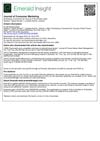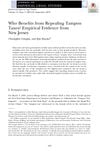 January 2012 in “Human health handbooks”
January 2012 in “Human health handbooks” Traditional Indian remedies are used for hair health, but more scientific evidence is needed to prove their safety and effectiveness.
 67 citations,
February 2015 in “Life Sciences”
67 citations,
February 2015 in “Life Sciences” Some plant-based treatments can help with benign prostatic hyperplasia symptoms, but more research is needed to confirm their safety and effectiveness.
 18 citations,
July 2018 in “Turk Pediatri Arsivi-turkish Archives of Pediatrics”
18 citations,
July 2018 in “Turk Pediatri Arsivi-turkish Archives of Pediatrics” Skin diseases in Turkish children vary by age and gender, with infections, eczema, acne, and allergies most common.
 2 citations,
January 2023 in “Plants”
2 citations,
January 2023 in “Plants” Plant bioactive compounds are important for health and can help prevent various diseases.
 February 2023 in “Asian journal of pharmaceutical research and development”
February 2023 in “Asian journal of pharmaceutical research and development” Flavonoids in Iraqi marshland plants have potential health benefits like antioxidant and anti-inflammatory effects.
 165 citations,
September 2011 in “Journal of Public Policy & Marketing”
165 citations,
September 2011 in “Journal of Public Policy & Marketing” People who are more materialistic often expect life changes from buying things, leading to more debt and credit misuse.
 1 citations,
December 2022 in “Türk tarım - gıda bilim ve teknoloji dergisi”
1 citations,
December 2022 in “Türk tarım - gıda bilim ve teknoloji dergisi” Diversifying tea products can boost profits and meet global market demands.
 11 citations,
December 2022 in “Arterial Hypertension”
11 citations,
December 2022 in “Arterial Hypertension” New guidelines stress early diagnosis and lifestyle changes to manage metabolic syndrome and prevent complications.
 17 citations,
January 2007 in “Popular Communication”
17 citations,
January 2007 in “Popular Communication” Makeover TV shows promote unrealistic beauty standards and suggest women's worth is based on looks.
 16 citations,
February 1992 in “Journal of Consumer Marketing”
16 citations,
February 1992 in “Journal of Consumer Marketing” The authors suggest systematically sourcing new product ideas from various internal and external places to improve innovation.
 5 citations,
December 1942 in “Journal of the American Medical Association”
5 citations,
December 1942 in “Journal of the American Medical Association” Choline and biotin are important for liver health and preventing certain deficiencies in animals, and more research is needed to understand their benefits in humans.
 September 2021 in “Physiology News”
September 2021 in “Physiology News” Addressing underrepresentation in Parkinson's research is crucial for better treatments and understanding.
 November 2023 in “International Journal of Medical Sciences”
November 2023 in “International Journal of Medical Sciences” New regenerative medicine-based therapies for hair loss look promising but need more clinical validation.
83 citations,
August 2020 in “Resources” Macroalgae compounds offer sustainable, effective benefits for cosmetics.
 17 citations,
April 2020 in “Dermatology and Therapy”
17 citations,
April 2020 in “Dermatology and Therapy” The PRP-like cosmetic product with postbiotics effectively treats hair loss in Alopecia areata.
 9 citations,
March 2019 in “Anthropology and Medicine”
9 citations,
March 2019 in “Anthropology and Medicine” PCOS in India is linked to broader sociocultural and environmental changes, not just diet and exercise.
 16 citations,
August 2018 in “Journal of empirical legal studies”
16 citations,
August 2018 in “Journal of empirical legal studies” Repealing tampon taxes helps low-income people the most by making menstrual products cheaper.
5 citations,
December 2023 in “Materials” Organic and biogenic nanocarriers can improve drug delivery but face challenges like consistency and safety.
 33 citations,
August 2018 in “Facial Plastic Surgery Clinics of North America”
33 citations,
August 2018 in “Facial Plastic Surgery Clinics of North America” The document explains hair biology, the causes of hair loss, and reviews various hair loss treatments.
 207 citations,
April 2006 in “Journal of The American Academy of Dermatology”
207 citations,
April 2006 in “Journal of The American Academy of Dermatology” Iron deficiency may be related to hair loss, but there's not enough evidence to recommend iron screening or supplements for all hair loss patients.
 8 citations,
December 2021 in “International Journal of Family Studies, Food Science and Nutrition Health”
8 citations,
December 2021 in “International Journal of Family Studies, Food Science and Nutrition Health” Extra virgin olive oil may boost the immune system and help fight infections like COVID-19.
 3 citations,
January 2005 in “Media Asia”
3 citations,
January 2005 in “Media Asia” Advertising in China shifted towards entertainment, favored local brands, and played a significant role in the country's move to a consumer economy.
 October 1890 in “Science”
October 1890 in “Science” Pilocarpin can cause hair regrowth and color change in some cases but not in others, and it may have side effects in animals.
 29 citations,
March 2008 in “Postcolonial Studies”
29 citations,
March 2008 in “Postcolonial Studies” The article concludes that the global hair trade is exploitative and reflects complex cultural and economic issues.
 May 2023 in “Endocrine, metabolic & immune disorders”
May 2023 in “Endocrine, metabolic & immune disorders” Hibiscus rosa-sinensis is used in traditional medicine and is safe in high doses, with various health benefits.
 8 citations,
July 2022 in “Biomedicines”
8 citations,
July 2022 in “Biomedicines” Autophagy helps keep skin healthy and may improve treatments for skin diseases.
76 citations,
April 2002 in “Urology” Selenium and vitamin E supplements have mixed effects on prostate cancer risk and may not be beneficial for everyone.
 7 citations,
December 2021 in “Pharmaceutics”
7 citations,
December 2021 in “Pharmaceutics” Natural products like plant extracts can help promote hair growth and could be used to treat hair loss.
 22 citations,
October 2020 in “Frontiers in Cell and Developmental Biology”
22 citations,
October 2020 in “Frontiers in Cell and Developmental Biology” Fisetin, a type of polyphenol, may help hair grow by increasing certain protein activities in cells.
 2 citations,
September 2000 in “International Journal of Retail & Distribution Management”
2 citations,
September 2000 in “International Journal of Retail & Distribution Management” The document concludes that understanding consumer-brand relationships is key for marketing and that perceived quality helps national brands maintain higher prices than store brands.



























